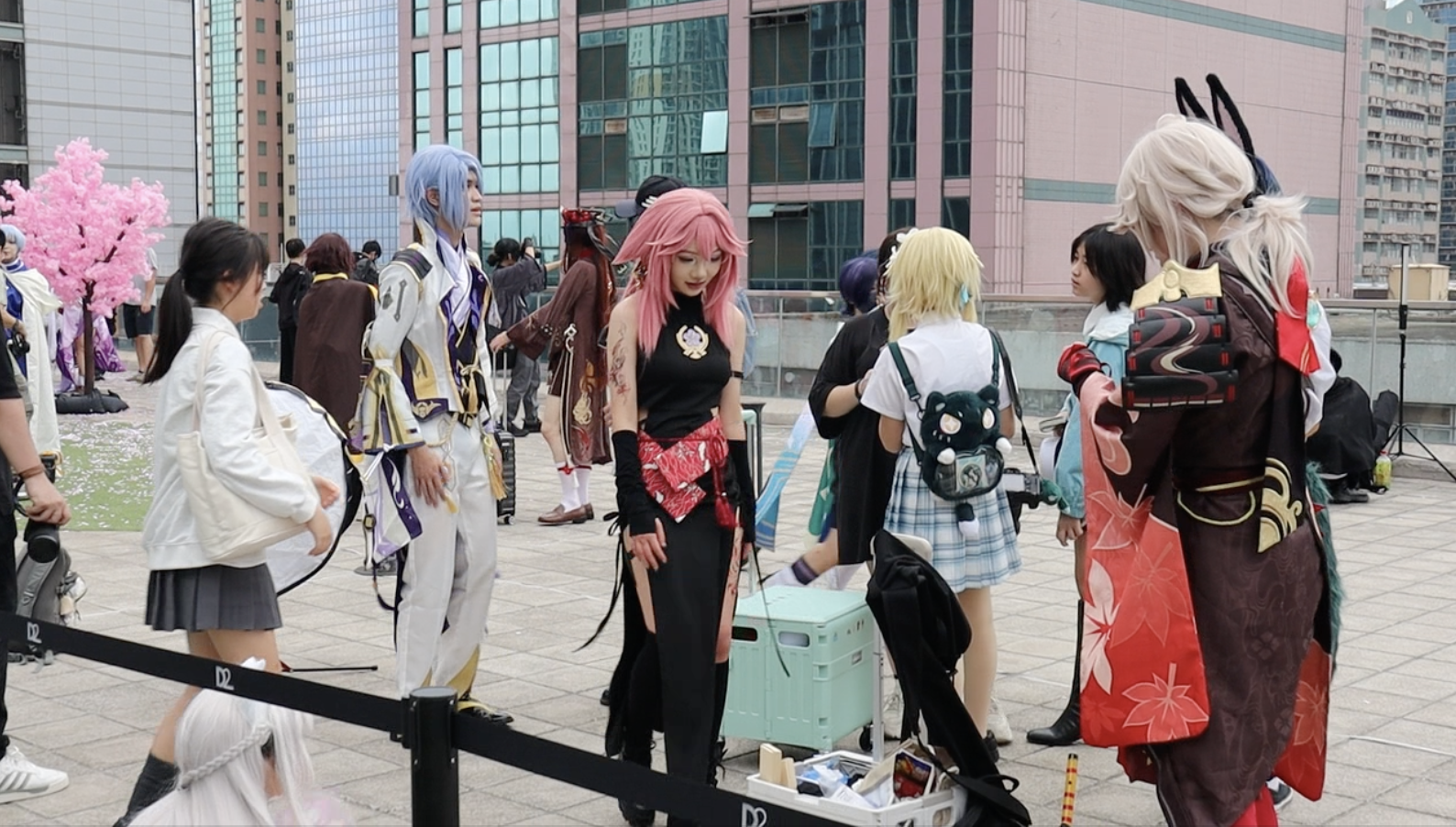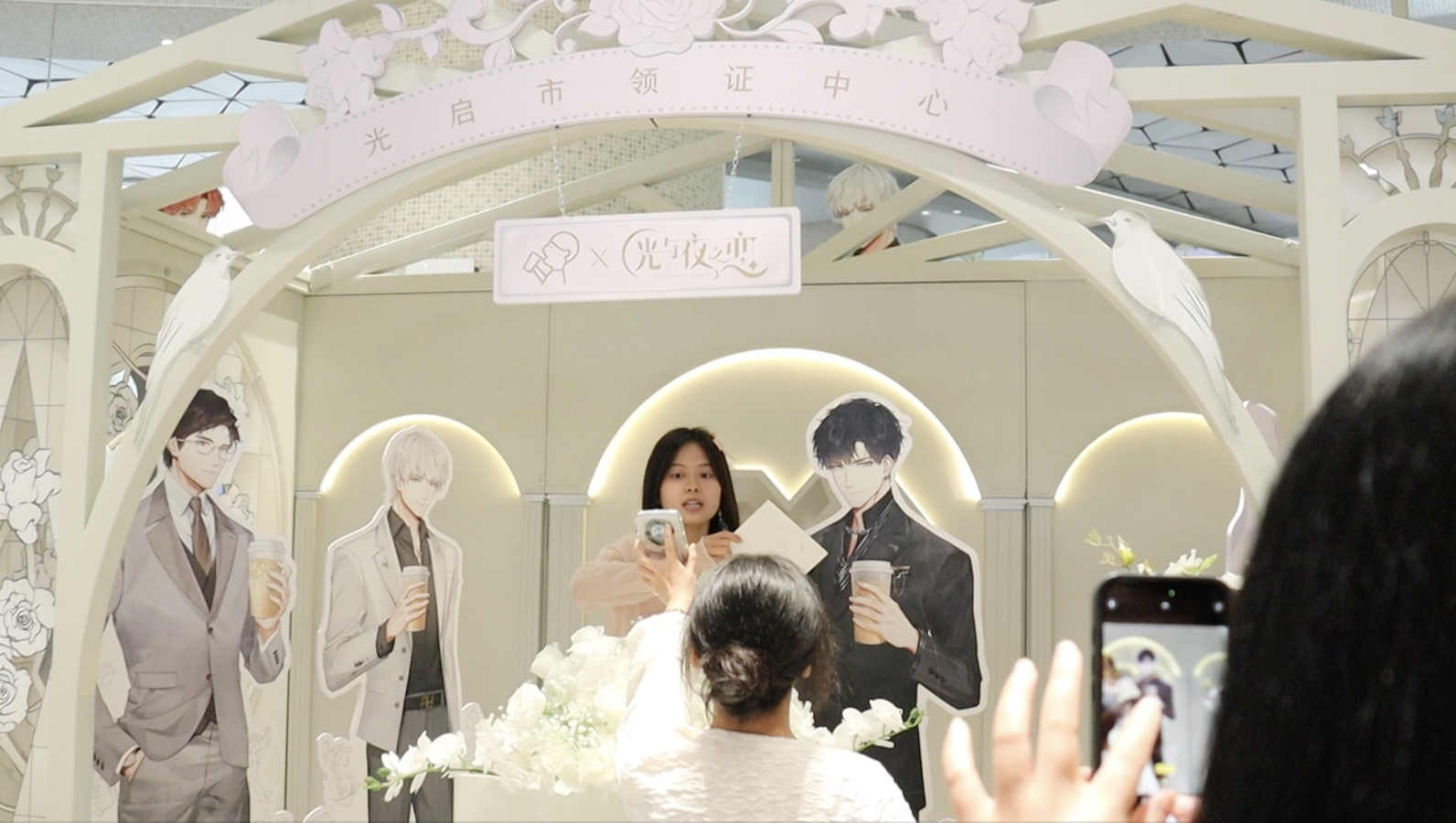Do you have a certain favourite character that only exists in anime, games or novels? If so, have you ever dreamed that one day he pr she would come from the fictional world and appear in reality to spend the day with you? If so, your dream has come true.
First, please choose one of your favourite characters from the pictures below. You have invited a cosplayer who can cosplay that character.
(All four of these characters are from the Otome games. Otome games are episodic games targeted towards women. In addition to completing the main story line, one of the goals of the game is to develop a romantic relationship between the female player character and male characters.)
When you get home, the cosplayer sends you a greeting message, she wants to know if you had a good day, how the date went, and wants to make sure you don’t feel sad about the separation. This is also the time when you need to pay the commission fee for the date.
The Role of Cosplay Commission
For customers, cosplay commissions can provide them with a sense of companionship and bring the emotional value they need to their otherwise uneventful life.
Interviewee Xiaoqin said that dating with a cosplayer is a way for her to find someone who meets her expectations for a day of fun. It helps her release the pressure of school, and gives her the motivation to work hard to earn money to save up for the next time she spends money on a cosplay commission.
She admitted that it’s hard for a real person to fully transform into a fictional character, but “as long as the joy he brings me is big enough, it’s fine.” In fact, cosplay commissions mean something different to each preson; some really see it as a date with an otherworldly lover, while others may only see it as the company of a friend.
As a mature woman living alone, Black Cat is very rational and believes that the most important thing for a customer is to find out what she wants, not what she expects the cosplayer to bring to her. If customers are not clear about the purpose of cosplay commissioning, then often the experience may not be ideal.
For cosplayers, while it is undoubtedly a way for them to make money, the cosplayers interviewed also felt that they themselves gained positive emotions, such as happiness, from providing services to their clients.
Interviewee AoAo has become good friends with many customers and cosplayers in her nearly one year of working in the cosplay commissioning business, and the commissioning process is like going out with new friends for her, and she has become more cheerful, and because she has received a lot of compliments and positive feedback from her customers, she has also become more self-confident.
Jiang Jiang and Fan Luo said that they started to take cosplay commissions with the purpose of making others happy, and since the characters they cosplayed were all characters they liked and knew very well, they “brought happiness to others, and they also felt satisfied” during the commissioning process.
“There were times that felt like harassment.”
Jiang Jiang, the cosplayer, encountered an unsettling situation. During a break at the café, the customer, after petting a cat, approached Jiang Jiang and touched her as if stroking the cat’s chin. She was quite uncomfortable with this.
“She also made several unacceptable flirtatious gestures while sitting close to me. This has caused a huge psychological fallout to me.” Jiang Jiang recalled with a hard frown. She was hesitant to explain her experience in detail.
This experience is a microcosm of the larger problems with professional limits in cosplay commissioning.
This kind of issue reflects the continuous struggle within the cosplay community to determine suitable boundaries. While some consumers view some physical contact, such as hugging or hand-holding, as an essential component of the commission experience they are purchasing, many cosplayers find these expectations intrusive and occasionally coercive.
“There have been times when the customer’s physical expectations of me have been nothing short of harassment, leaving a lasting negative impact on me.” Another cosplayer, Fan Luo, who has offered two free commissions, said.
To preserve the delicate balance between the client’s expectations and the cosplayer’s personal comfort and safety, both sides must have clear guidelines and mutual respect in the process.
This challenge extends beyond the commissioning process to connections after commission. Some cosplayers and clients agreed to stay in touch, potentially developing friendships in their daily lives, while others opted to keep their interactions more professional to ensure that their role in cosplay commissioning remained applicable.
“I keep in touch with some of my clients, and we eventually become friends, ” said another cosplayer, AoAo, who has completed over 60 cosplay commissions. “However, I always ensure that it is a consensual decision.”
Different expectations between customers and cosplayers have brought to ethical conundrums as the cosplay commission expands, highlighting the urgent need for clear norms and standards. These guidelines are essential for safeguarding both side’s personal space and mental health.
In response to these difficulties, a number of cosplayers have started creating comprehensive questionnaires that specify precisely what constitutes appropriate conduct in social situations. The goal is to avoid miscommunications and guarantee fair conversations, defending the rights of both cosplayers and customers.
Passion or Profit
An hourly rate in the busy world of cosplay commissions often costs between 50 and 80 yuan, and major platforms for these services include Xiaohongshu and Xianyu. However, depending on elements like the amount of service rendered and the popularity of the cosplayer, the prices can differ greatly. Some cosplayers charge as much as several thousands yuan for a full day of accompaniment; this is a significant amount that frequently needs significant savings by the customers, especially for younger ones anxious to see their favorite characters come to life.
The financial side of cosplay commissions present a different story from the cosplayers’ point of view. Many cosplayers argue that, although their fees may appear to be really high prices, their profits are actually quite low when you take into account the considerable effort and expenses that go into getting ready for commissions. Their diligent creation of character-appropriate objects, accessories, and costumes constitutes a significant portion of their preparation. This procedure requires costly, specialized materials in addition to a lot of preparation time.
Cosplayers in Comic Con in HongKong | Photo by Ruoyi Kong
Additionally, cosplayers frequently add to their clients’ experiences by giving well-thought-out gifts, which raises their expenses even more. Many discover that, even with these high fees, their real profit is quite low.
“Cosplay can be quite costly, from crafting the costumes to attending activities. The commissions I receive help cover those expenses,”said cosplayer Xi.
For the majority, their work is motivated more by the deep love for cosplay and the joy it offers to them than by a desire to make money. Cosplayers’ dedication to their profession is highlighted by this devotion, which is sometimes referred to as doing something freely but just for passion. Cosplayers see their work as a labor of love and an artistic expression, rather than just a service.
As Black Cat, a 32-year-old regular cosplay commission customer, said:
“The money I spend is not just for a service. It’s for an experience that brings my favorite characters to life.”
This emphasizes the emotional and social ties made during these engagements, which many clients value more than the cost of the service itself.
However, expectations vary. Some clients, such as Xiaoqin, who is preparing her next commission, want a high level of professionalism and engagement, indicating a more transactional approach to service delivery.
As cosplay commissions become more popular, the complexities of their reasons increase. Although profit is important, the passion for anime and gaming culture frequently overshadows financial considerations in favor of the shared joy of bringing imaginary characters to life. This tension between profit and passion drives the emerging story of the cosplay commission, requiring players to handle both the financial and emotional sides of their interactions.
What the future will be like
Players photo with characters in game themed store | Photo by Ruoyi Kong
Due to the boom of Otome games – those that involve virtual boyfriend or girlfriends – among women, female gamers are gradually increasing their status in the gaming market, and cosplay commission – an extension of the virtual to the real – is becoming more and more popular among female gamers. They may be afraid of establishing intimate relationships with men in real life, but prefer to imagine a romantic date with a flawless male character in the game. There is also a growing number of people who try to provide cosplay commission service for the fans of Otome games and others, for whatever purpose.
There is currently no official authority regulating the cosplay commission market. However, due to the considerable cost of commissions, there are gradually business people who are eyeing this piece of cake. On Xiaohongshu, we found that an app that provides a platform for cosplay commissioning seems to have been completed, and many adverts have been released inviting cosplayers to join. But many comments are not favourable. Customers don’t want to pay extra intermediary fees for the platform, and cosplayers don’t want their income to be shared. Although the platform advertises that it can provide a safer and more secure service for both sides, it seems that the development prospect of this app is not bright at the moment.
As to whether cosplay commissioning can really become an industry, Japan may be able to provide us with a reference. Japan has a long history of “one-day boyfriend/girlfriend” experiences and has a special website to manage and provide such services. The process is more uniform and formal.
Many people think that cosplay commission in China is similar to “one-day boyfriend/girlfriend” in Japan, except that cosplay commissioning is still in the stage of private transactions. However, due to China’s thousands of years of culture and social system, it is difficult to legalise the selling of emotion services. Unlike the development of the Japanese soapland industry, in which customers pay for a massage in bathhouses, get to know the masseuse and then enter into sexual transactions, evading the anti-prostitution law, traditional Chinese society places more emphasis on fulfilling the expectations of the general public than on the enjoyment of private emotions.
Cosplay commissioning currently has many problems due to such personalisation, but the lack of uniform standards and norms makes it difficult to control. As a niche cultural hobby, we seem to be able to expect only the self-awareness of both sides of the transaction.
Credits
Advisor: Foon Lee & Cindy Sui
Producer: Yujia Zhang & Ruoyi Kong
Thanks to @临溪止矣 @妖怪春歌 @十九次夜慕 for image license


